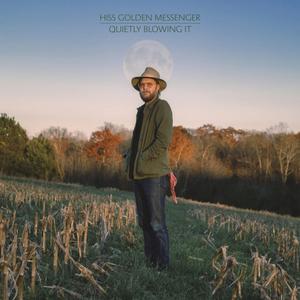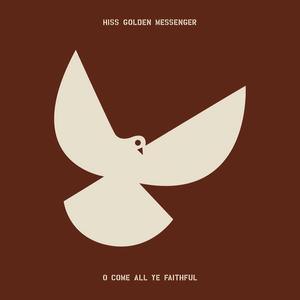




Link copied

The Austrian poet Rainer Maria Rilke once wrote to his young protege, “I want to beg you...to be patient toward all that is unsolved in your heart and to try to love the questions themselves like locked rooms and like books that are written in a very foreign tongue”.
In an age when the answers may have become more searchable thanks to Google, though no clearer, M.C. Taylor — the man behind Hiss Golden Messenger — has made his life’s work out of loving the questions themselves. There’s always more to ask — and more to say. If you think he’s settled on an outcome based on one album, he’ll pick those questions up yet again and continue pushing on the next.
Over the course of his prolific career, Taylor is crafting an ongoing investigation into more existential matters: of identity and self, of family and fatherhood, of faith, of art and what happens when it has to “pay the rent”, as he sings on 2016’s ‘Cracked Windshield’. The result is one of the most profound and insightful catalogues from a contemporary musician.
Taylor never could have anticipated the flurry of writing he accomplished over the course of the pandemic. He has — he thinks — around eight albums, but he’s releasing one: Quietly Blowing It. Written amid a time of chaos and confusion, the album finds Taylor wrestling with the systemic issues hurting his community and country, as well as how he’s been molded by such systems.
On the funk-leaning ‘Mighty Dollar’ he examines the endless churn of capitalism, the song’s rhythm reminiscent of an assembly line; on ‘It Will If We Let It’ he extols the value of trying despite finding words that seem to “have no meaning”. The situation could easily be personal, a couple wrestling with what they mean to one another, or political, a populace that still has much to learn, to do.
Taylor balances those two perspectives — personal and political — on Quietly Blowing It, crafting a muted protest album that ultimately lands on hope, or as Taylor puts it, the “possibility of hopefulness”. But it’s still not a final conclusion — it's a brief light illuminating the darkness. As he sings on the gospel-tinged ‘Sanctuary’, “That little light has gotta last a while”.
Taylor spoke with Holler about what fueled Quietly Blowing It, why hope feels like such a powerful emotion these days and the music he’s gravitated to most during the pandemic. We asked him to discuss his five favorite songs or albums for Cuts The Deepest, and instead he came back with over three hours of music that has helped him most over the past year.

In your essay Mourning in America, you wrote about a distinction between transactional labor and transformative — or more nourishing — labor. How do you qualify music within that framework?
I think the moment that you start to pay your bills with your art, whatever that might be, the danger of the balance shifting from transformative to transactional becomes very real. I guess I can only speak for myself. There’s a whole new set of issues that come into play when all of a sudden it’s your art that’s supporting you financially.
Those issues have come up thematically time and again, but I’m thinking back specifically to Heart Like a Levee. Have you found any clarity?
While I continue to evolve as a musician, to create things that to me sound new and fresh, I also am really drawn to a lot of the same themes that I started working through on records, even [2010’s] Bad Debt. The way that I deal with that is by asking questions in the music and trying not to answer them. I think my way of questioning has changed, has sharpened, but I don’t think that it’s always a straight evolution forward. I think sometimes it moves sideways or even involves rethinking my positions entirely.
I’ve always appreciated how you’ve continued to deepen your engagement with these questions, as if they’re never quite settled.
I would be lying if I said what the answer is. I feel like, in part, it’s a reaction to this time of instant gratification, instant answers that we seem to be living in, where you can engage with something and have it tied up with a bow in two minutes. I think I’m more of a long-form person. I think that Quietly Blowing It is as deep and rich a record as I’ve made.

It sounds like you were nearing burnout by the start of 2020 from your touring schedule. What do you think helped you reach a more nourishing relationship with your work?
Being off the road and being away from that particular type of grind. By the end of 2019, we had been touring for a long time. I had been on and off the road for many years and I was feeling pretty fried. It’s sort of a privileged problem to have, but is nevertheless a thing I struggled with. I’d drifted a little from the way I wanted to live with my music, but now, in spite of everything pulling me in so many different directions, I feel like I have really rekindled a very specific relationship with my music.
I also made a ton of records this past year. Quietly Blowing It is the only one I’m talking about right now, but between March of 2020 and May 2021, I turned in eight records. Some are Hiss records and some are not. I started working on music that I have been keeping on the back burner for years. I just thought, “Ok, if this type of music feels important and separate from Hiss Golden Messenger, then now is the time to work on it”.
You mentioned being interested in protest music but not in the traditional sense. Instead, it’s music that’s personal, internal. Can you elaborate a bit more on that?
I don’t know very much about protest music, but I think one thing I’ve talked about in the last month or so - this is obviously a theme that’s resonating with people - is leaving space for hope, or leaving space for the possibility of hopefulness, which is kind of different than protest music. I feel like it’s closer to gospel or devotional music. It’s recognizing that things are hard now, but it’s sort of incumbent on us to keep a little light burning, because if not, then what?
Curtis Mayfield did it, the Staples Singers did it. It’s no surprise that both of those artists are Black artists. Thinking about the time during which they wrote some of their most powerful music, I have to think that they weren’t waking up every day feeling abundantly hopeful, but there’s something in their music that says “keep on pushing” - Mayfield even wrote a song with that title.
Well, it’s instructive in a way that keeps pushing against those problems, rather than simply restating them.
I think that work, the best of those types of songs, is meant to remind you of your own personal resolve. The things we’re dealing with now aren’t going to be solved overnight.

For Cuts The Deepest, Taylor shared a long list of songs that have peppered his listening history this past year - check out the playlist above now. Below, he details four in particular and how they helped him.
Miles Davis - 'Sivad'
One area of music - or one mode - that I was really drawn to this year seemed to mirror what I felt like was happening outside. It was this really hectic, almost atonal, jazz stuff. A lot of the Miles On the Corner stuff. Stuff that felt noisy and dislocating.
Jaybird - ‘Comets on Fire’
This lives in that same realm for me, too - this sort of in-your-face music, where it feels like you’re being shaken. That’s something I felt drawn to this year and has really resonated with me in a pretty deep way.
Yabby You & The Prophets - ‘Jah Vengeance’
I’ve spent the past year and a half listening almost exclusively to reggae music made between the 70s and 80s. I think that era was primarily the roots era, so it’s a lot of devotional Rastafarian - heavy old testament Rastafarian reggae and dub. It feels so hypnotic. It’s really a language; the more you devote your listening to it, the more of the language you understand. I love the devotional aspect of it. The past year, I’ve thought a lot about faith and what part faith plays in music and how it can be used effectively and the best of that music does it in a really compelling way.
Robert Stillman - As he Walked Into The Field
The flip side of the really atonal, syncopated jazz stuff is the more meditative piano-based stuff. That was another thing I was really drawn to this year. Those Alice Coltrane tracks especially, and that Robert Stillman track. He’s truly special; he played all the instruments. He was the little brother of my wife’s best friend growing up.
- - -
Hiss Golden Messenger's new record Quietly Blowing It will be released on June 25 via Merge Records. Watch the video for the new single 'Glory Strums (Loneliness of the Long-Distance Runner)' below.
Photography by Chris Frisina / Graham Tolbert





